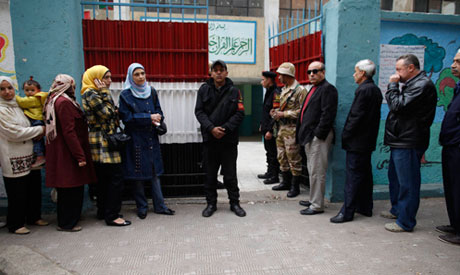
Soldiers stand guard as people wait outside a polling center to vote in a referendum on Egypt's new constitution, in Cairo December 15, 2012 (Photo: Reuters)
For many Western diplomats in Cairo it is exhausting to stay on top of the developments of the current political process. At times it can get disturbing or even worrying. However, as some told Al-Ahram Online on Friday evening, the current political process offers more reason for hope than for concern.
"The most disturbing part – and I know that not many of my Egyptian friends would agree on this – is the clear state of division that has hit society; it is as if Egypt has turned into two camps," said one European diplomat. She added that many of the Egyptian intellectuals and "ordinary citizens" she has been talking with over the past few weeks regarding the constitution up for referendum "which, of course, is part of a wider political debate" seem to be predominantly concerned over the "control the Muslim Brotherhood is trying take over everything in the country."
For this diplomat, who is nearing the end of her four-year term in Egypt, "Yes, the Muslim Brotherhood and other Islamists are hoping to dominate; we could all see this, but we could also see that it's not easy for them," she added.
The "strong and very vivid reaction" that many political forces have demonstrated should not be overshadowed by Islamists' manoeuvrings to monopolise and "marginalise" other political forces - to borrow a description used by some of her interlocutors.
According to this and other foreign, mostly Western, diplomats in Egypt, the outcome of the constitutional referendum is unlikely to end the political tug-of-war that began with the drafting of the constitution, which has been controversial since twice the Assemblies drafting it saw withdrawals of key non-Islamist representatives, including churches in Egypt.
"My thinking is that the result will be a 'Yes' vote – not by a big percentage but eventually a 'Yes' vote. People would accept it but they would continue to demonstrate and they would lobby for parliamentary elections," predicts a Western ambassador.
He added "throughout the course of this there might be some very tough and even sad moments, there might be blood, but eventually this political process would bring about a democracy by which the Islamists would have to adjust some to be able to continue to be part of the political scene."
But for some Egyptian diplomats who spoke to Ahram Online, what they see does not necessarily subscribe to this hopeful view, in face of a scary vision offered by the foreign diplomatic community in Egypt.
"A regime that starts with an attempt to force a 'Yes' vote on a controversial draft constitution is unlikely to be set to adjust to the demands of the nation," said an Egyptian diplomat who is based overseas.
He claims he was witness to what he qualifies as the "attempt of the ambassador to impress the Muslim Brotherhood by soliciting the leadership of the Egyptian community here to encourage Egyptians to come out to vote in favour of the draft constitution." This early-career Egyptian diplomat says that the most he could do was to decline participation in this "fiasco."
For other Egyptian diplomats the sporadic reports of attempts to interfere in the voting process overseas or in Egypt is not the biggest fear. "The most worrying part is that the Americans are very keen to keep this regime in office; they think it serves its interests in a way that even the [ousted president Hosni] Mubarak regime has not," said one diplomat.
According to this diplomat, Americans are "very comfortable with the role the current regime is playing with Hamas as it encourages Hamas to keep its anti-Israeli resistance activities at a minimum."
Other diplomats speak of more "significant services."
"The regime is now acting as mediator between Washington and other Western capitals with militant Islamist groups in Africa and elsewhere in the Middle East."
The militants in Mali and those in Syria, according to this and other Egyptian diplomats in Cairo and overseas, have been approached by the Morsi regime to abate their attacks in return for political integration.
"For the [US President Barack] Obama administration this is the way forward to deal with militant Islamist groups: encourage them to modernise. For this to happen there must be one or more examples of ruling moderate Islamic regimes - the Muslim Brotherhood in Egypt is designed to be the key example," said one Europe-based Egyptian diplomat.
He added that what he hears from the European capital he is based in indicates "hardly any interest in the march of democracy in Egypt; there might be a few concerns in some quarters over the state of Christians in Egypt, but beyond that there is a general acceptance that some time should be given to Islamists to try and rule – one way or the other."
Sources close to the Egypt – International Monetary Fund talks say the US used precisely this argument of "give the Islamists a chance to rule in Egypt and moderate other Islamist groups" to pressure the IMF to release the $5 billion in funds they had delayed, despite the concerns over the country's political and economic status.
Short link: